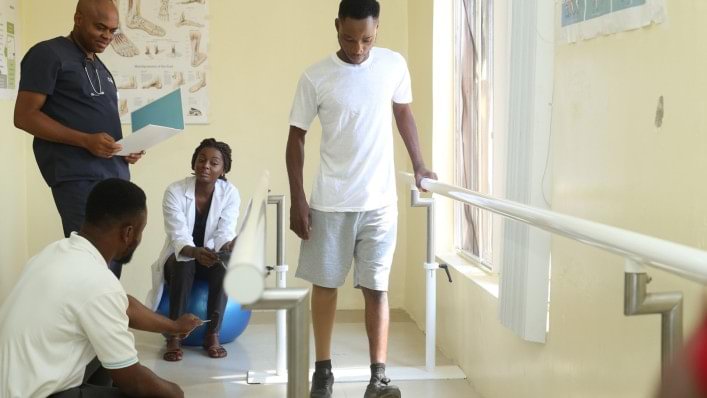Fitting team

These experts are there for you and look after your treatment
Your care before and after an amputation is in the hands of a team of experts in various specialties. We have listed the members of this team here and described the role each of them plays in your treatment.
The O&P professional plays a central role within this team. We advise you to seek contact even before the amputation if possible. Our list of experts can help you find someone who already has a great deal of experience in working with leg amputees and therefore can provide you with good advice.
Surgeon
The surgeon advises you before the amputation and performs the operation. Ideally the surgeon coordinates the course of the operation with your O&P professional in advance. For example, the surgeon and O&P professional can discuss the shape of your residual limb ahead of time, which makes the subsequent fitting of your prosthetic socket easier. After the amputation, the surgeon monitors your convalescence and prescribes rehabilitation.
General practitioner and specialist
Your general practitioner and specialist have usually looked after you even before the amputation and are familiar with the course of your illness. They are available when you need prescriptions for new prosthesis components or additional rehabilitation measures.
Social education workers and social services
A social education worker or other social services employee usually looks after you while you are still in the hospital. Their task is to help you during your return to everyday life. This includes topics such as your home, education, work, family, income and social networks. They tell you what services are available and how you can access them. Examples of services include medical, special and social education measures or assistance for participation in social life.
Inpatient nursing staff
After the amputation, nursing staff in the hospital and specialised wound managers look after wound healing and the correct positioning and compression of your residual limb. Ideally this is coordinated with the doctors, O&P professional and therapist.
Physiotherapists and occupational therapists
Physiotherapists and occupational therapists assist you in the hospital, during rehabilitation and in everyday life. Their task is to mobilise you, to strengthen and stretch your musculature, and to help you learn and further improve walking and coping with activities of daily living. In the hospital, therapists also do compression therapy.
O&P professional
Your O&P professional plays a central role since they fit you with a suitable prosthesis and can offer advice if you have questions. Leading up to an amputation, the O&P professional can discuss with the surgeon what your residual limb should look like if possible. They can recommend experienced therapists or orthopaedic shoemakers and establish contact with other amputees. You can also ask them about things like a contact for home conversions or vehicle alterations.
When fitting you with a prosthesis, the O&P professional clarifies your needs and preferences and discusses the various fitting options with you. Based on this, they select the appropriate prosthesis components and fabricate your prosthesis with a customised prosthetic socket. They will examine your residual limb shortly after the amputation and determine whether an interim prosthesis is an option for you.
Your O&P professional is available to you for all questions related to your prosthesis.
Orthopaedic shoemaker
In addition to the prosthesis, you may need shoes to fit your sound foot. This may be the case if you suffer from circulatory disorders, for example. Orthopaedic shoes may also be an option for you in case of a partial foot amputation if you do not wear a partial foot prosthesis. Ask your O&P professional for contact information.
Outpatient nursing staff
Depending on your family situation, outpatient nurses can assist you with using the prosthesis and also take charge of compression and mobilisation in everyday life.
Relatives and social environment
Your relatives also contribute to your rehabilitation and will attempt to support you to the best of their ability in daily life. What concrete role they can play depends on your personal situation. It is possible for a relative to assist you with the daily use of the prosthesis and help you with everyday tasks.